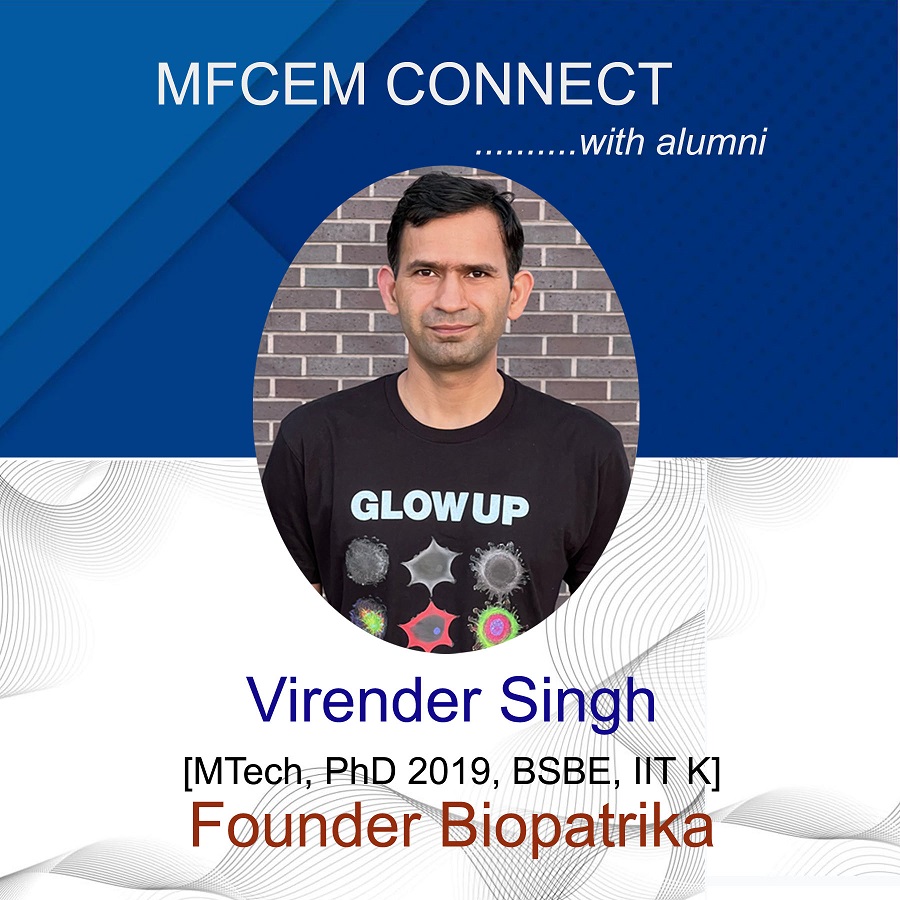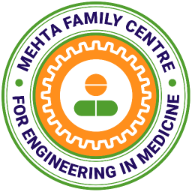
featuring
Virender Singh
[MTech, PhD 2019, BSBE, IIT Kanpur]
Founder Biopatrika
MFCEM: Hi Virender, great to connect. It is wonderful to see you straddle diverse fields with equal ease. You were part of the Biotech industry at one point, then you immersed yourself into research/academics, and with all this you have also managed to keep your passion for science communication on—having launched the “BIOPATRIKA”. What motivates you? Is it possible to dabble in more than one activity and do full justice to it?
Virender Singh: My exploratory nature was always supported by my family. I was in biology-stream at school but opted for engineering in college. Later, I resigned from my very cushy job at Biocon to pursue a PhD and now left home behind to do my postdoctoral training in the USA. Having family’s support is always a blessing but the top-up is having friends and mentors to help and guide at each career stage. Like the curious mind of every researcher, I used to come up with hundreds of ideas during my PhD, for example hydroponics, packaged sugarcane juice, etc but never reached anything conclusive. A part of me was always at unrest, though. I had that bug of doing something on my own. I took the first step by starting a science based departmental painting competition ‘Prakriti’ with the help of my friends at IITK and it was very well received.
It was only during the COVID-19 lockdown in 2020 that the idea of Biopatrika struck me and with the help of my wife, Preeti Singh who happens to be the co-founder of Biopatrika, it all began with a handful of articles. One evening, as I sat down to discuss the future of Biopatrika with Preeti, we came up with the idea of interviewing Indian scientists/researchers including PhD students.
Within a few months, the “magazine” became a volunteer-run platform … working on different aspects but towards a common goal - “To bring Science to Society.”
Slowly we started putting bit by bit together and she has been instrumental in the whole process of building Biopatrika. Within a few months, the “magazine” became a volunteer-run platform with more than 60 volunteers working on different aspects but towards a common goal - “To bring Science to Society.” Our motivation is always to reach out to maximum people and help them understand not only science but different ways of contributing to society with science communication as one of the modes. IIT Kanpur Alumni Mohit Jolly and Suhail Rizvi are our advisors and several BSBE department alumni are our core team members. We have published articles and infographics on social issues and health related issues (such as cervical cancer) with the help of content writers and illustrators. This year, we launched the first season of our podcasts covering journeys of scientists, writers, entrepreneurs, and some big-shots of science… you name it, we have it! In addition to that, we conduct weekly mentorship sessions with the patronage of Dr. Narendra Chirmule, CEO of SymphonyTech Biologics.
All said, Biopatrika is not my full time job. Currently, I am a postdoc at UT Southwestern Medical Center working on understanding structural polymorphism of Transthyretin amyloid using cryoEM technology. I am trying to explore options to map the ATTR amyloidosis in India, in collaboration with Prof. Ashwani Kumar Thakur from IIT Kanpur. I am interested in discovering if there is any structural diversity specific to the Indian subcontinent. I am excited to learn cryoEM, the best available tool for protein structural studies.
Research is something I enjoy doing everyday while science communication through Biopatrika is my passion. Though I am fully committed to my research, I spare time for Biopatrika as my way of giving back to society. I always try to achieve work-life balance but at times it becomes difficult to manage. I am lucky to have an amazing partner who reminds me of keeping a tab on my physical and mental health. It is a tough job to wear multiple hats, but not impossible. At the risk of sounding like a parrot, I do believe hard work, patience and consistency are key. Managing multiple tasks without doing injustice to any is something I learned over the years… from my mistakes, my experiences and learnings from my mentors.
MFCEM: I would like to talk to you about Biopatrika. In today’s digital world there are many portals trying to bring the science to the common man. What Gap did you identify that made you conceive the Biopatrika.
Virender Singh: Science communication or communication in general is not something that aligns naturally to me. I am not good at it. I still remember an incident when my graduate institute Director condemned me in front of my class for not being able to speak english for 2 minutes and missing the campus placement drive. I was unable to clear job interviews due to my lack of communication skills. Regardless, I had a strong belief in myself. Most people will agree that effective communication is a problem that many face but they don’t get the proper help to cultivate such skills.
…we are working on a Mentorship program to mentor students about different career points. …….soon you will see our new initiative “Indian Professionals Network (InPN)” which will show Sci Career Profiles of professionals with a PhD degree who are now working in industry.
Post- COVID, we have seen an immense increase in the number of science communication platforms worldwide, an obvious phenomenon to cater to the growing need for information relating to disease and human health. India is also not far behind in this field, but there is a catch there. As a scientist, when our peer-reviewed articles get featured in newspapers, it is majorly the lab supervisor who is highlighted. I always wondered that the young lab members are left behind in that narrative.
I wanted their story to be told too! So, to motivate young researchers, we thought of interviewing the first authors of the research articles and getting to know their thoughts about the work and how they think it will help or is relevant to society. In doing this, we are not just helping young researchers communicate their science to the public in simple language but also providing a platform to share thoughts about Indian science. Apart from this, we are working on a Mentorship program to mentor students about different career points. Every Tuesday we invite professionals to share their journey and directly interact with students. Soon, you will see our new initiative “Indian Professionals Network (InPN)” which will show Sci Career Profiles of professionals with a PhD degree who are now working in industry. There are several other initiatives in the pipeline which are unique and aimed to fill the existing gap. Another important aspect Biopatrika achieved is to provide a platform for our members to network and grow.
Although several digital communication platforms have aimed to “bring science to society”, which by the way is our motto; we are a unique entity. Biopatrika is a no- nonsense platform that gives you exactly what you want. Our articles are heavily researched and written by field experts, our author interviews showcase just how India’s research will impact the global society, our podcasts are gems where people who have made their mark share insights about their journey via an informal conversation and our mentorship program equips you with career building tools for life. I don’t think there is another vision in the scicomm field like ours.
MFCEM: I understand that one of the major focus of the Biopatrika is to take science to the common man. At any point does Biopatrika also hope to tap into the vast “Vernacular” space?
Virender Singh: Thanks for pointing out this important aspect. When we started we chose english to tap on the college students. But our aim is to reach society in a way where knowledge of the English language is not a prerequisite. We are a volunteer-run organisation, so it is difficult to find people who could communicate science in regional languages effectively. We are always on the lookout for interested folks! But we are surely working on expanding to the vast “Vernacular” space. In fact, we are keen on starting a space where language isn’t necessary at all. Perhaps just some beats and tunes? You’ll have to stay tuned for our next big move!
MFCEM: Does ‘Biopatrika” facilitate a 2-way conversation, or for instance, there could be brilliant scientific ideas out there, that need a careful listening to. Would Biopatrika, at any point in the future provide such a platform?
SciKonnect will serve to connect with science enthusiasts with brilliant ideas.
Virender Singh: This is a great question. Biopatrika is moving in this exact direction. We are creating the “SciKonnect” platform as an independent entity with Biopatrika serving as our eMagazine. SciKonnect will serve to connect with science enthusiasts with brilliant ideas. We as well are always open to ideas and do our best to integrate all that matches to our mission. Our Tuesday Mentorship sessions is one such example where our team partnered with Narendra Chirmule to professionally conduct mentor interaction sessions with him. Our team members are also coming up with workshops in the science communication space and soon you will see a bunch of workshops encompassing useful skill development and career projections. Another branch of initiatives is collaboration with Scicle Podcast founder Ananthapathmanabhan who wanted to do a podcast series in the field of Neuroscience. So, Biopatrika definitely facilitates a 2-way conversation and always values all sorts of ideas put forth. If anyone reading this interview also has an urge to contribute and join us, we will be the happiest!
MFCEM: Do you believe that now more than ever there is dire need to introduce scientific writing/communication, not merely as a subject, but as a formal course for students to earn a degree in.
Virender Singh: Yes, I absolutely agree that it’s the right time to have more experts dealing with scientific writing and communication. With so much scientific progress happening in the world, thousands of research articles are published online daily. It is very important to convey the right scientific message in the simplest of terms so that anyone could understand it. Often, as scientists, we fail to convey our research to the public and that creates an understanding gap. So, if we have people who not only understand science but also ways to communicate it to the public, that would be great not only for the public but for scientific advancement too. To clarify, non-scientists understanding the need for a particular type of research may help draw in more funding, acceptance and pave a path for several keen back-shelf avenues.
But that said, we do not need to rush to have another degree for the sake of it. Science communication often comes from the experience of actually communicating science. For example, one could try to come up with a short article about one’s research work and support it with some illustrations. Here, it is important to know one’s audience. How much does the targeted person already know? Should I start from the bare basics? Talk to your family, your grandparents and even children! People are more receptive to things they understand. I think one should start with volunteer opportunities to share. This will not only help them gain writing experience but perhaps open up another career option. At Biopatrika we are always open to such submissions that encourage young scientists and students.
MFCEM: Finally, for all the youngsters just starting on their career, what would your advice be?
Virender Singh: My advice for youngsters is to focus on long term goals and always take care of physical and mental health. Also, try to find mentors, not just one but a few, whom you could approach for guidance at different stages of your career. Create a healthy and productive network of people around you. I will recommend doing informational interviews with a few folks who are working in your field of interest. This will give you an idea what to expect if you pursue that field and then make a judgement whether it is something you would like to do or not. And in case you want to build your network and talk to professionals, you are invited every Tuesday for Biopatrika Mentorship sessions.
Links
Website: https://biopatrika.com/
Facebook: https://www.facebook.com/biopatrika
Twitter: https://twitter.com/biopatrika
Linkedin: https://www.linkedin.com/company/biopatrika/
Instagram: https://www.instagram.com/biopatrika/
YouTube: https://www.youtube.com/c/biopatrika

